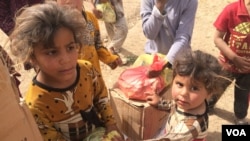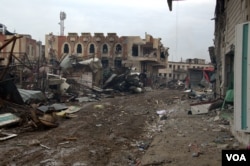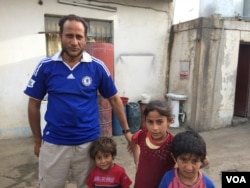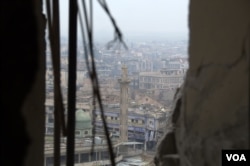Flies buzz around thin cushions placed in the center of the cement yard. Hannah, 25, doesn't brush them away as she sits with her mother-in-law, whose swollen leg juts off the pillows. The elder lady doesn't appear to notice the swarm, and two flies perch on her forehead.
"All the flies in the neighborhood are here," says Sabhan, Hannah's husband, joking as he joins the women in the yard. "They think we are food."
The other families of this Mosul suburb fled the area as Iraqi forces beat Islamic State militants deeper into the city a few weeks ago. Sabhan and his family stayed because his mother was too sick to travel. Their neighbors now are Iraqi soldiers and the Tigris River, their only source of water.
Mohanad, the couple's three-year-old son, is sick from drinking river water. They have no electricity, cooking gas or income.
Sabhan jokes easily, but his smile fades just as fast. "This is liberation?" he asks. "I don't feel liberated."
Like many families in the ruins of Mosul, they thought the fall of IS would mean more than just the absence of the militants' brutality. They thought Iraqi forces would be followed by aid organizations and government assistance. They thought freedom would mean food.
"With IS in charge we had nothing. We were eating only tomato paste and bread," Sabhan says. "But now there is still no help."
Soldiers bunked in an abandoned house nearby share their water and food, he says; but as the war moves on, so too do the fighters and the small spare provisions they have. Sabhan and his wife ask an Iraqi translator if he thinks they would be better off at one of the refugee camps surrounding Mosul.
"It's hot and crowded and you have to live in a tent in the desert," he says, encouraging the family to stay put. "Here, at least you have your house."
Building economies
A few kilometers away, 40 families still live in their homes in Damerche, a dusty village on the outskirts of Mosul with crumbling homes, some bombed in recent battles.
A Red Crescent truck stops in the center of town, and skinny children line up to collect bread, rice and bottles of water. It's never enough, the children say, but it is all they have.
"We don't have anything to eat but what they give us," says 10-year-old Amina. "The last time anyone brought us anything was two weeks ago."
Damerche has always been a farming community, with most of its meager wealth in sheep; but, under IS, the economy collapsed as community members with government jobs stopped getting paid. The cement factory nearby closed down.
Islamic State militants also confiscated some sheep, claiming farmers had a religious duty to give up a percentage of their livestock.
With little outside help, and no sign that Baghdad salaries will soon inject cash into tiny economies like Damerche, farmers here say they are trying to build businesses on their own, but it will be a long time before they will be able to feed themselves.
In areas still held by IS militants, the situation is more dire. When Iraqi and coalition forces announced the Mosul offensive in October, families across the city stored away as much food and water as they could. Seven months into the battle, Damerche residents say their relatives still trapped inside are starving.
"They are boiling leaves on the trees for soup," says Moseer, a 29-year-old farmer with three children and 150 sheep. "My uncle says they are paying [money] ... for weeds from the ground."









